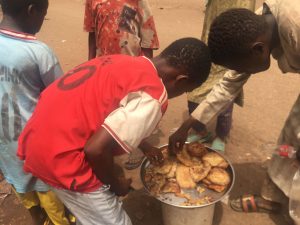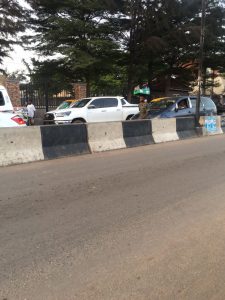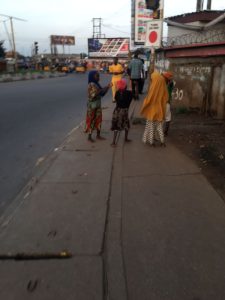By Habeeb Olokooba

Water! From the black lines of the irises that define his glassy eyes. A betrayal from the sockets which he had for long stored tears that he never intended to let fall. Yusuf (last name withheld) was in Senior Secondary School (SSS2) when his old friend Wale (not real name) returned from Lagos with a brand new ladies bike. Yusuf’s mother, like every other mother in the neighborhood, had a simple average dream for her son: seeing him flourish both academically and his apprenticeship.
With Wale’s triumphant return, being average no longer entices Yusuf. Whatever Wale does in Lagos, he’s ready to go all in for it. He would later learn from Wale that Lagos begot all the riches. According to Wale, it is a land where “milk and honey” flowed ceaselessly. The new revelation further enticed Yusuf more. The 16-year-old pupil couldn’t wait to migrate into the city beside the Atlantic. The year was 2019.
With a bag full of dreams, little to no clothes to avoid suspicions, Yusuf snuck out of his home one midnight and fled to Lagos with Wale. Although Wale’s tales were the last straw that drifted him out of his comfort zone, Yusuf had long been fed with the history of how promising Lagos can be.
A friend of his had told him months earlier on how he could earn up to 3,000 naira daily just by doing normal domestic chores. He had always known that only a smart kid could enjoy the riches Lagos has in store without disturbance. He also knew that if things go south, he could lose everything overnight.
However, Yusuf confirmed to this reporter that he had no inkling what his new home had in store for him. It was when he got to Lagos that he realized Wale was into all sorts of internet fraud.
“And when I defy him, he threw me out of his self-contained apartment barely two weeks after arriving Lagos,” he was saying. “That was the last time I saw him,” Yusuf ended.
For three days, he was pillaging different slums, surviving on the proceeds of pure water which Yusuf had by now learned to sell at the express.
“For some moments, I missed the comfort back in Ilorin. But I’ve by now come too far for regrets.”
Although mild, Yusuf never had a reason to go hungry while his struggling mother lived. The poor woman’s pot would cook live onto Yusuf’s mouth and belly, at least twice everyday. Yet, there he (Yusuf) was on the cruel street of Lagos: struggling for every penny he’s got.
Despite the obvious oscillation between homelessness and hard life, Yusuf was enjoying his freedom. It didn’t take him time before he got someone to assist in looking after his wares. A sales boy.
He worked for six months before bidding Lagos a final farewell.
Although accessing the data of school-age kids who migrated from Kwara to Lagos is quite hard to come by. However, Yusuf’s story is not unique.
It was in the early year of 2022 when Tobi (not real name) suddenly made away with his father’s smartphone and completely emptied his bank account.
“It was through the help of community guards that helped capture him back home,” Ayuba, his brother, told this reporter. “ He was reprimanded for stealing the phone and emptying his father’s bank account.”
Unfortunately, pained by the torture, Tobi, after a week, stole all the proceeds from his grandma’s grinding business and flee to Lagos.
“What pained me more about the issue was how disturbed Iya elero (grandma) was about her stolen funds,” Ayuba pointed.
He told this reporter how he had assured the old woman that he would try and make the money back as business progressed.
“At first, we were worried about his whereabouts. My father even contemplated drawing him back home through diabolical means. However, he retorted about the effect it would have on his brain.”
It was after a year that he called to inform us that he is in Lagos. And truth be told, when I checked him up on social media he now sings hip-hop in Lagos.” Ayuba explained. “It is sad because he didn’t even finish his Secondary education.”
According to Kwara State Trust Fund, the gross enrollment rate for senior secondary schools in Kwara State is 39.08%, reflecting the proportion of total students enrolled regardless of their age.The net enrollment rate, which focuses on students within the appropriate age group, is significantly lower at 27.08%, indicating that only about a quarter of eligible youths are enrolled in senior secondary education. This gap underscores the pressing need for interventions to boost access and participation at this level.

The agency further identified poverty, societal distraction among others, as the exacerbating factors of drop out rate.
In October, 2024, Abdullahi Danbaba, a lawmaker representing the Kaiama, Kemanji, and Wajibe LGAs at the state house, moved a motion seeking to address the rate of out-of-school children in the state.
He furthered that, recent data show that approximately 200,000 children are out of school in Kwara, a situation he said is now at a “crisis level.”
Meanwhile, NBS data shows that 22 percent of Kwara’s child population aged between six to 15 years are out of school. Contributing a ugly quota to the country’s out-of-school children.
Go Hard or Go Home
For 19 years old Jimoh Ibrahim, his story was that of a dream he denied himself. A life he could have lived, yet, willingly tossed to the bin. During an interview, Jimoh reminisced how he let his chance to be schooled slip away.
It all started with a little misunderstanding with his dad. What started as a petty fight resulted in the teen fleeing from home.
“I decided to contact some friends of mine that are in Lagos to make an inquiry about Lagos life. A question which they responded with a promise that jobs are freely available there,” he began.
“The first day I landed in Lagos I dropped by Lagos Island and that’s where I lived but the place is nothing to be compared to animal’s shelter here in Ilorin,” he furthered.
All thanks to his vulcanizing training, Jimoh could feed himself. However, the job could barely fill the void of what he left behind: regular meals, education and a cozy home. Six months into the wild, when Jimoh could no longer go hard, he finally came back home.

“Lagos is not interesting at all, especially for those that left home without having relatives that will provide where to live and get a good job there. I can’t advise anyone to go there without having provision.”
Before leaving, Jimoh was a pupil of Government Day Secondary school Okekere, Ogidi, Ilorin. He however told this reporter about the unwillingness of his father to enroll him again.
When asked whether he is ready to go back to school if he gets someone to enroll him, he answered in the affirmative.
Taoheed Adegbite, a child rights advocate working with Tribune Nigeria, a platform using media as a tool for social change, told this reporter in an exclusive interview that the major reason that this could be happening is failed parenting. Many of these children have no one fending for them, so they choose survival over potential in education.
“Another reason could be the eroding value of education in our society. Almost everyone now understands the popular lingo: ‘school na scam,’ not only because they hear people saying it but they see it. We live and glorify it,” Mr Taoheed explained.
“Both reasons I pointed out put the blame on both the parents and government. Of course the world is evolving faster than what our seemingly static curriculum offers, but whose responsibility is that? Is it not the government?” he questioned.
He furthered that, though these can’t bring instant solutions but it’s a way out. These kids need to see the essence of going to school. The government has the curriculum to rework to focus more on most sought-after 21st century skills. Also, many of these kids who take initiative of ‘hustling’ to fend for themselves could make great innovators.
“Why not re-awaken what we used to know as technical schools? They can be returned to fully funded technical schools that provide incentives for competition innovation,” he ended.
Lagos: A Hub to Different Dilemma
When 15 years old Abdullahi* was handed over to his uncle who lives in Lagos, Andullahi’s joy knew no bounds. Like other kids of his age, Abdullahi’s dream was to be in school. A dream which his uncle vowed to fulfil while taking him from his hometown at Oke Odan, Ogun State.
“My uncle is a mechanic that repairs generators. He brought me to Lagos with a promise to enroll me in school besides learning generator repair,” Awal said with a faint smile.
However, contrary to the arrangement, his uncle was only interested in the errand he runs at the mechanic shop.
“When I realized he’s not willing to sponsor me in school, I ran away from home. And now I do this for survival,” he continued waving his hands at his surroundings, a construction site at Ebutte meta Lagos, where he does labourer for bricklayers.
A shovel should be a tool for grown men, but 15 year old Abdullahi wields it so well. When this reporter walked up to him, he wielded the equipment with an uncommon zeal. Fueled by a passion to survive amidst the cold streets of Lagos, Abdullahi had brought himself to the conclusion that school wasn’t for him.
When asked if he’s willing to go back to school, even if he found someone to sponsor him, he chuckled and said in Yoruba, “ori mi o gbe we mọ” meaning, “My head doesn’t assimilate books again.”
Meanwhile, Conflict Management and Peace-building experts have warned that the increasing numbers of out-of-school children in Lagos State have assumed a worrisome dimension and called on the state government to urgently engage stakeholders to put measures in place to address the menace.
They spoke, in July, at a one-day meeting on Preventing and Countering Violent Extremism (PCVE), where a Steering Committee was inaugurated in Lagos State to work out an Action Plan for preventing violent extremism.
Speakers identified the influx of young adults and children from states across Nigeria into Lagos, and those within the state without parental care and guidance as a leading factor that has resulted in the large number of children on the streets of the commercial city.

It is these children that go about either begging for alms or engaging in nefarious activities that constitute dangers to residents.
Child Labor: What Does The Law Say?
Under the Child Rights ACT, 2023, a legislation that protects children and young adults in Nigeria, the engagement of children in any form of labour that is harmful to their development is illegal. Although the minimum age for employment is 15 years, it was stated that the work must not interfere with the children’s education.
The ACT also condemns all forms of exploitative labour, as some of the provisions state that no child must be employed as a domestic help outside the home or domestic environment. No child must lift or move anything heavy that might affect their physical health or social development, and no child must be employed in an industrial setting that is not registered as a technical school or similar approved institutions.
While the lack of implementation of the Child Rights Act is a major concern, inflation and poverty, among other reasons, were identified as reasons for the growing child labour and continuous exploitation of children in Nigeria.
Speaking with this reporter, Habeeb Gobir, a human rights advocate based in Abuja, informed this reporter that the Child Rights Act (CRA) makes it clear that every child in Nigeria has a right to education. But in Lagos State, the real challenge is not the law itself, it is the failure to fully enforce it.
“Many children remain out of school because there are no strong systems to compel parents and guardians to send their children to school, and the government has not consistently provided enough schools, teachers, or learning materials to make education truly free and compulsory. Issues such as child labour, street trading, and poverty thrive because the protective measures of the CRA are not effectively applied,” he stated.
The Abuja based legal Practitioner, working with Templars, one of the leading Law firms in Nigeria, furthered that, if the Child Rights Act were better implemented in Lagos through proper funding of schools, enforcement of compulsory attendance, and targeted support for vulnerable families, the rate of out-of-school children would drop significantly.
On the implications, Barrister Gobir added that when laws like the Child Rights Act are not enforced, the immediate implication is that children are denied access to their most basic right which is education. This leaves many of them vulnerable to child labour, street trading, and exploitation. Over time, the society pays the price through higher illiteracy rates, unemployment, and cycles of poverty that are difficult to break.
“In the long run, non-enforcement weakens public trust in law and governance, while also creating a generation less equipped to contribute productively to national development. A society that fails to protect and educate its children risks instability, higher crime rates, and a future workforce unprepared for global competitiveness,” he ended.
“Lagos is a victim of its success.” — Lagos Information Commissioner
In an interview with this reporter, Lagos State’s Commissioner for Information, Gbenga Omotoso, acknowledged this issue. However speaks about how hard the state is working in ensuring no child is denied access to education. In his words.
“Our mantra is that no child should be left behind. We are encouraging all parents to ensure that all children are in school. That is why Governor Babajide Sanwo Olu insists that no money should be collected for enrollment in schools,” Mr Omotoso explained
“Besides, we are building schools that are good for comprehensive education so that none will drop out because he or she wants to learn a trade; this can be done while schooling,” he added.
He furthered that Lagos is a victim of its success. People keep flooding in everyday, putting pressure on the infrastructure. The law does not allow Lagos to stop people from coming.
“For me, it’s a job for us all to do – from the take-off point where they come from and the destination here in Lagos,” he ended.
*The asterisked names are pseudonyms we used to protect the identities of the sources.
